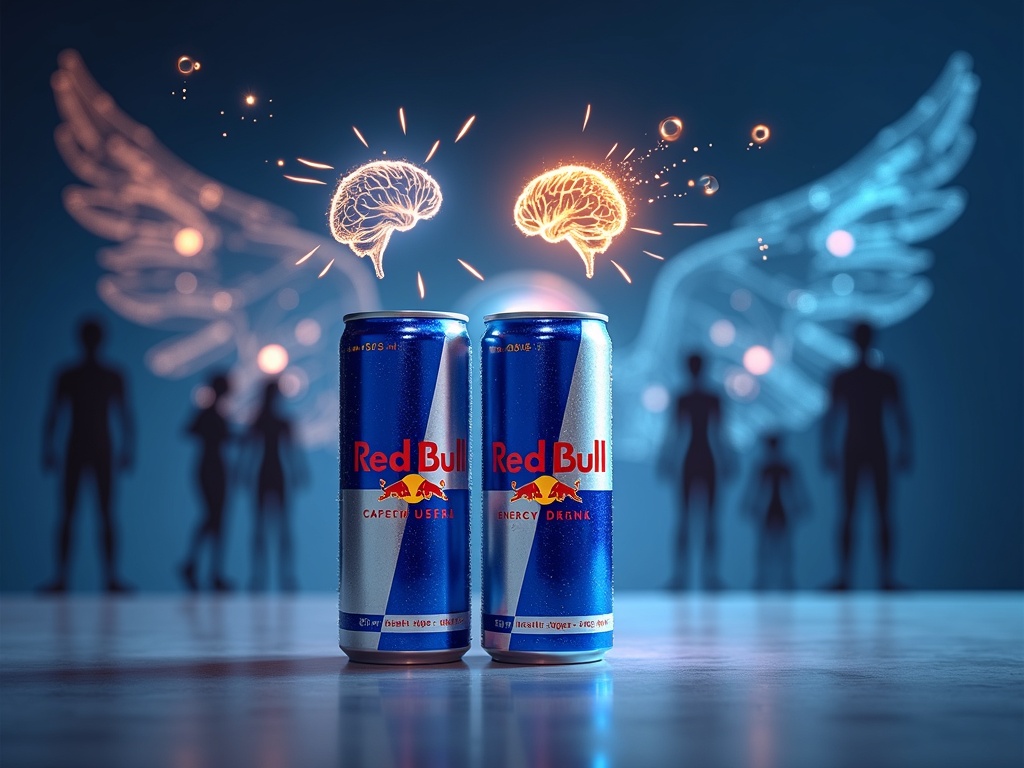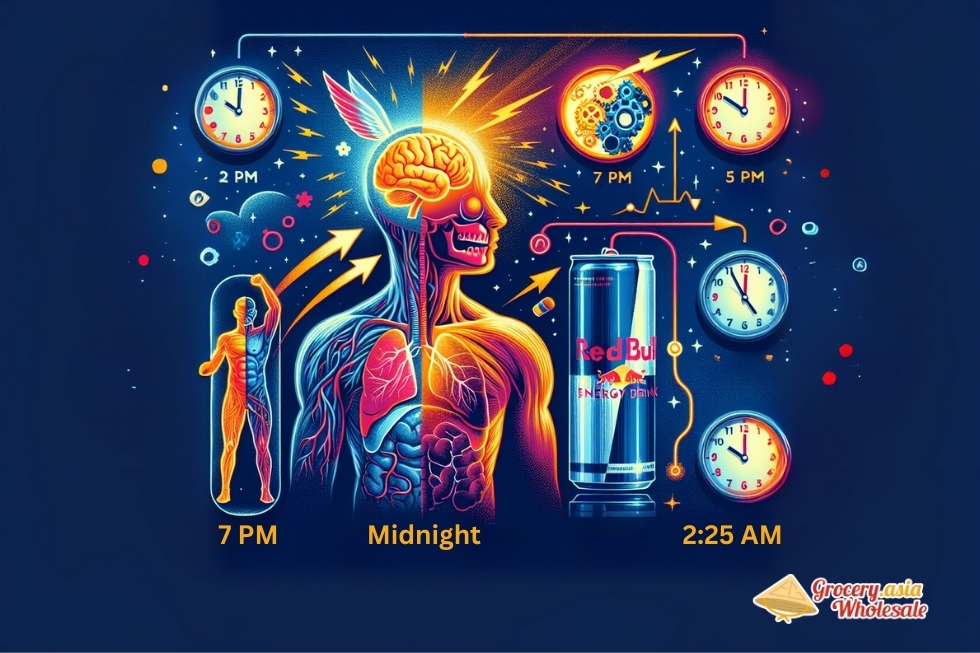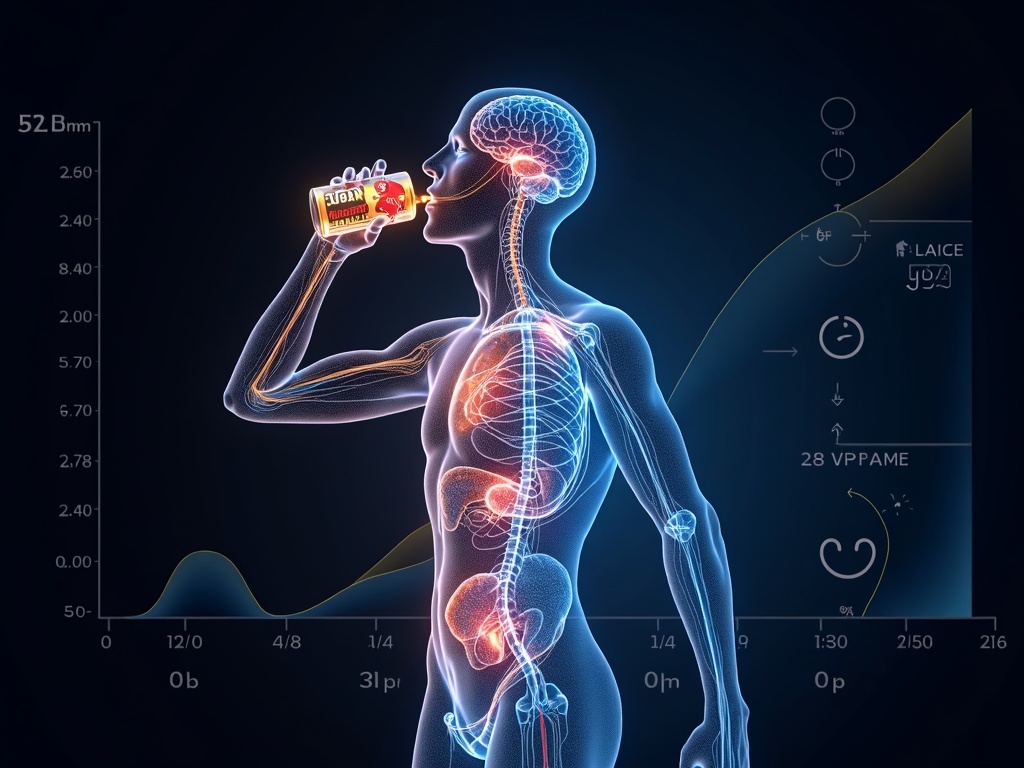No products in the cart.
Beverages News, Energy Drinks, Red Bull Energy Drink
How Long Do Red Bull Energy Drink Last To Keep You Awake
Red Bull energy drinks offer a temporary surge in alertness and wakefulness, typically lasting between 3 to 5 hours, with peak effects felt within 30 to 60 minutes of consumption.
Key Takeaways
- Red Bull’s energizing effects can last between 3 to 5 hours, with the most noticeable alertness occurring 30–60 minutes after drinking, as caffeine levels reach their highest point in the bloodstream.
- One standard 8.4 fl oz can of Red Bull contains 80mg of caffeine. With a caffeine half-life of 5 to 6 hours, roughly 40mg remains in your system after that time, and smaller traces may linger for a total of 8 to 10 hours.
- Several individual factors—such as body weight, caffeine tolerance, metabolic rate, genetics, and whether you’ve eaten—play a significant role in determining how long Red Bull keeps you awake.
- An energy crash is inevitable 3 to 5 hours after consumption, triggered by adenosine receptor flooding and a drop in blood sugar levels due to Red Bull’s 27 grams of sugar.
- To protect your sleep quality, it’s recommended to have your last can of Red Bull at least 6 hours before bedtime. Limit Red Bull to one can per day to avoid excess caffeine and sugar intake.
To learn more about caffeine timing and effects, visit the official Red Bull website for details on their drink compositions and recommendations.
Table of Contents
The Caffeine Impact: Red Bull’s Exact Stimulant Content
A standard 8.4 fl oz (250 ml) can of Red Bull Energy Drink contains 80 milligrams (mg) of caffeine. This precise measurement places Red Bull within a moderate caffeine range when compared to other caffeinated beverages. The larger 12 fl oz (355 ml) can increases the stimulation with 114 mg of caffeine.
To put these numbers in perspective, an 8 oz cup of brewed coffee typically contains around 95 mg of caffeine. This means a regular Red Bull provides slightly less caffeine than your average morning coffee, while the larger size surpasses it. Understanding caffeine in Red Bull helps you gauge how it’ll affect your system compared to other familiar drinks.
How Caffeine Works in Your System
Caffeine begins entering the bloodstream within 10-15 minutes of consumption. This rapid absorption explains why you might start feeling more alert almost immediately after drinking Red Bull. However, the caffeine doesn’t simply create energy—it operates through a specific biological mechanism.
Caffeine is a central nervous system stimulant that functions by blocking the neurotransmitter adenosine, which is responsible for making you feel tired. Think of adenosine as the body’s natural “sleep switch.” As the day progresses, adenosine accumulates in the brain, gradually inducing drowsiness. Caffeine blocks these adenosine receptors, preventing that tired feeling from being registered.
Peak Effects and Duration
The effects of Red Bull’s caffeine peak approximately 30-45 minutes after consumption. During this peak period, you may experience maximum alertness, enhanced focus, and improved physical performance. Yet, your body continues to process the caffeine well after the peak has passed.
Caffeine has a half-life of approximately 5-6 hours for most adults. This means that after this time, half the caffeine you consumed is still in your system. For instance, if you drank a standard can containing 80 mg of caffeine, around 40 mg would still be active after 5 to 6 hours. Complete elimination can take up to 8-10 hours.
Several individual factors influence how long energy drink effects last in the body:
- Body weight and composition
- Metabolic rate
- Tolerance to caffeine
- Overall health and hydration
- Age—younger adults metabolize caffeine faster
- Medications—some can enhance or inhibit caffeine metabolism
- Pregnancy dramatically slows caffeine processing
Beyond caffeine itself, Red Bull includes other synergistic ingredients such as taurine, B-vitamins, and sugar. These components can intensify or alter how you experience caffeine’s effects. The blend produces the distinctive energy surge that causes many to say Red Bull gives you wings.
If you’re sensitive to caffeine or planning to go to bed soon, it’s wise to time your consumption carefully. Knowing what happens in your body after consuming energy drinks helps you make better choices regarding quantity and timing.

Peak Effect: When Red Bull Hits Its Maximum Potency
I’ve found that understanding when Red Bull reaches its peak effectiveness can help you time your consumption perfectly for maximum benefit. The science behind this energy drink’s timing is straightforward yet fascinating.
The 30-60 Minute Sweet Spot
Caffeine levels in your bloodstream reach their peak approximately 30 to 60 minutes after you crack open that iconic blue and silver can. This window represents when your body experiences the most pronounced effects of increased alertness, focus, and energy. During this critical period, you’ll notice your mental clarity sharpens and your physical energy surges to its highest point.
The peak effect timing isn’t random—it directly correlates with how quickly your digestive system processes and absorbs the caffeine and other active ingredients. Your stomach absorbs caffeine rapidly, but it takes time for the compound to travel through your bloodstream and cross the blood-brain barrier where it blocks adenosine receptors responsible for drowsiness.
During this peak phase, your heart rate and blood pressure may also temporarily increase as your cardiovascular system responds to the stimulant effects. These physiological changes are normal and typically mild for healthy individuals, but they’re worth noting if you’re monitoring your body’s response to caffeine intake.
Strategic Timing for Maximum Performance
I recommend timing your Red Bull consumption to align with your specific needs. If you have an important presentation at 2 PM, drinking your Red Bull between 1:00 and 1:30 PM ensures you’ll hit peak alertness right when you need it most. This strategic approach maximizes the energy boost effects during critical moments.
The intensity of the peak effect varies based on several factors including your body weight, caffeine tolerance, food consumption, and individual metabolism. People who rarely consume caffeine typically experience more pronounced peak effects, while regular caffeine users might notice subtler changes during this window.
Individual factors that influence peak timing include:
- Your current caffeine tolerance level
- Whether you’ve eaten recently (food can slow absorption)
- Your body weight and composition
- Your natural metabolism speed
- Any medications you’re taking that might interact with caffeine
I’ve observed that the peak effect feels different for everyone. Some people experience a gradual building sensation, while others notice a more distinct shift in energy and focus. The key is recognizing your personal response pattern so you can optimize timing for future consumption.
Understanding Red Bull’s ingredients helps explain why this peak timing occurs. Beyond caffeine, the drink contains taurine, B-vitamins, and sugar, each contributing to the overall energy experience. The sugar provides immediate energy, while caffeine delivers the sustained alertness boost that peaks within the hour.
Temperature and consumption method can also affect peak timing. Drinking Red Bull cold versus at room temperature, or consuming it quickly versus sipping slowly, may slightly alter when you experience maximum potency. Cold beverages are absorbed more slowly, potentially extending the time to peak effect by 10-15 minutes.
For optimal results, avoid consuming Red Bull on a completely empty stomach if you’re sensitive to caffeine, as this can intensify the peak effect beyond comfortable levels. Similarly, don’t drink it immediately after a large meal, which could delay the onset and reduce the peak intensity.
The peak effect period is also when you might notice sugar’s influence most strongly. The combination of caffeine hitting its stride and sugar providing quick energy creates that characteristic Red Bull experience that explains why the brand promises wings.
Recognizing your peak effect window allows you to plan activities that require maximum mental or physical performance during this optimal timeframe.
How Long Will You Stay Alert? The Timeline of Red Bull’s Effects
I’ll break down exactly what happens after you consume a Red Bull and how long those effects of drinking energy drinks stick around in your system.
The stimulating effects you feel from Red Bull typically last between 3 to 5 hours. During this window, you’ll experience peak alertness, increased focus, and that characteristic energy boost. However, the story doesn’t end when these effects fade away.
Understanding Caffeine’s Journey Through Your Body
The key to understanding Red Bull’s duration lies in caffeine’s half-life. For healthy adults, caffeine has a half-life of 5 to 6 hours on average. This means your body needs that amount of time to metabolize and eliminate just 50% of the caffeine you consumed.
Let me illustrate this with a practical example. If you drink an 8.4 oz Red Bull containing 80 mg of caffeine at 2 PM, here’s what happens to your caffeine levels:
- By 7 PM (5 hours later), approximately 40 mg of caffeine remains in your system
- By midnight (10 hours later), about 20 mg still circulates through your body
- Even 15 hours later, traces of caffeine continue affecting your system
This extended presence explains why drinking Red Bull later in the day can interfere with sleep, even when you no longer feel actively energized. What happens in your body during this process involves complex metabolic pathways that vary from person to person.
Individual factors significantly influence how long Red Bull’s effects last. Your age, weight, metabolism rate, and tolerance level all play crucial roles. Regular energy drink consumers often develop tolerance, requiring higher amounts to achieve the same effects while still experiencing prolonged caffeine presence.
The combination of Red Bull’s ingredients beyond caffeine also contributes to its duration. Taurine, B-vitamins, and sugar content work together to create the overall experience, though caffeine remains the primary driver of lasting effects.
For optimal results, I recommend consuming Red Bull at least 6 hours before your intended bedtime. This timing allows the most intense effects to wear off while giving your body time to process the majority of caffeine. Understanding why Red Bull gives you wings helps you make informed decisions about timing and consumption.

Beyond Caffeine: Sugar and Other Energizing Ingredients
I’ve discovered that a standard 8.4 fl oz can of original Red Bull packs 27 grams of sugar, which represents a significant portion of your daily intake. The American Heart Association recommends limiting daily sugar consumption to 36 grams for men and 25 grams for women, meaning one can delivers nearly your entire recommended allowance.
The Sugar Rush and Crash Cycle
Sugar provides rapid but temporary calories that fuel your body’s initial energy surge. Sugar content in Red Bull creates an immediate spike in blood glucose levels, delivering quick energy that typically lasts 30–60 minutes before declining sharply. This temporary boost explains why many people experience a noticeable energy crash several hours after consumption, as blood sugar levels drop below baseline.
Red Bull Sugarfree eliminates this sugar component entirely, removing the associated crash while maintaining other energizing elements. Without sugar’s rapid absorption, you’ll experience a more sustained energy profile that relies primarily on caffeine and other ingredients.
B-Vitamins and Taurine’s Supporting Role
Red Bull’s ingredient profile includes essential B-group vitamins (B3, B5, B6, B12) that play crucial roles in energy metabolism. These vitamins help convert food into usable energy at the cellular level, supporting your body’s natural energy production processes rather than providing direct stimulation.
Taurine, an amino acid naturally found in your body, comprises another key component. Research suggests taurine may enhance athletic performance and support cardiovascular function, though its exact mechanisms remain under study. Unlike caffeine’s immediate stimulant effects, taurine works more subtly to support your body’s energy systems.
I recommend considering these ingredients when evaluating how long Red Bull’s effects will last. While caffeine provides the primary stimulation lasting 4–6 hours, sugar delivers immediate but short-lived energy, and B-vitamins plus taurine offer metabolic support throughout the duration. Understanding what happens in your body after consuming these ingredients helps predict your energy timeline more accurately.
The combination creates a multi-phase energy experience:
- Immediate sugar rush (if present)
- Sustained caffeine stimulation
- Underlying metabolic support from vitamins and taurine working together over several hours

Why Your Experience May Differ: Personal Factors Affecting Duration
I’ve noticed that Red Bull affects everyone differently, and the duration can vary significantly from person to person. Several key factors determine how long you’ll feel the effects of drinking energy drinks like Red Bull.
Individual Response Variations
Your caffeine tolerance plays a crucial role in determining how long Red Bull’s effects last. If you’re a regular coffee or energy drink consumer, your body has adapted to process caffeine more efficiently. This means you’ll experience less intense effects that fade faster than someone who rarely consumes caffeine. A daily coffee drinker may find the 80 mg of caffeine in a Red Bull provides only a mild lift that fades quickly, whereas a non-caffeine user could feel strong effects for several hours.
Body weight and metabolism significantly impact caffeine sensitivity. People with lower body mass typically feel stronger effects from the same amount of caffeine. Your metabolic rate also matters — if you have a faster metabolism, you’ll process and eliminate caffeine more quickly, shortening the duration of effects.
Genetics determine much of your caffeine experience through variations in the CYP1A2 gene. This gene directly controls how fast your liver breaks down caffeine. “Fast metabolizers” clear caffeine from their system much sooner than “slow metabolizers.” If you’re genetically predisposed to be a slow metabolizer, you might feel Red Bull’s effects for 6–8 hours, while fast metabolizers may only experience effects for 2–3 hours.
Food timing dramatically affects both intensity and duration. Drinking Red Bull on an empty stomach leads to faster absorption and a more immediate peak effect. However, consuming it with food slows down the absorption process, creating a more gradual rise in caffeine levels that can lead to longer-lasting effects. This explains why some people report feeling energized for hours after having Red Bull with breakfast, while others experience a quick spike and crash when drinking it solo.
Your sleep quality, stress levels, and current health status also influence how your body processes Red Bull’s ingredients. Dehydration can intensify caffeine effects, while certain medications may slow or speed up metabolism. Age factors in too — younger adults typically metabolize caffeine faster than older individuals.
Understanding these personal factors helps you predict your own response patterns and time your Red Bull consumption accordingly.
The Inevitable Crash and Safety Guidelines
I’ve experienced the dreaded energy drink crash firsthand, and it’s something every Red Bull consumer should understand. The crash hits approximately 3-5 hours after consumption, leaving you feeling more exhausted than before you drank the energy beverage. This sudden fatigue isn’t just in your head — it’s a predictable physiological response that occurs when caffeine’s stimulating effects wear off.
Understanding the Science Behind Energy Crashes
The crash happens due to two primary factors working against your energy levels simultaneously.
- First, as caffeine leaves your system, it stops blocking adenosine receptors in your brain. Adenosine is your body’s natural sleep-inducing chemical that builds up throughout the day. When caffeine blocks these receptors, you feel alert and awake. However, once the caffeine wears off, all that accumulated adenosine floods back to bind with receptors, creating an overwhelming sense of tiredness.
- Second, your blood sugar levels plummet after the initial spike from Red Bull’s 27 grams of sugar. This sharp drop in glucose availability leaves your brain and body struggling for energy, amplifying the fatigue you already feel from the adenosine rush. The combination of these two effects creates what many describe as what happens in your body during an energy drink crash.
The U.S. Food and Drug Administration (FDA) provides clear guidance on safe caffeine consumption, stating that up to 400 mg of caffeine per day is generally considered safe for healthy adults. Since each 8.4 fl oz can of Red Bull contains 80 mg of caffeine, this technically means five cans would equal the FDA’s daily limit. However, I strongly advise against consuming anywhere near this amount due to several concerning factors.
Drinking five Red Bull cans would deliver a staggering 135 grams of sugar — more than four times the American Heart Association’s recommended daily sugar intake for men. This excessive sugar consumption can lead to serious health consequences beyond just an energy crash. You’d also risk experiencing severe side effects including:
- Jitteriness
- Anxiety
- Rapid heart rate
- Potentially dangerous increases in blood pressure
I recommend limiting yourself to one Red Bull per day, preferably consumed earlier in the day to avoid sleep disruption. If you find yourself regularly experiencing crashes, consider examining your overall sleep patterns and nutrition habits. Energy drink effects can vary significantly between individuals, so pay attention to how your body responds.
For those concerned about caffeine content specifically, understanding caffeine levels in Red Bull compared to other beverages can help you make informed decisions. The sugar content in Red Bull is equally important to consider when planning your consumption.
Alternative Strategies for Sustainable Energy
Rather than consuming multiple energy drinks to avoid crashes, focus on sustainable energy strategies like:
- Maintaining consistent sleep schedules
- Eating balanced meals throughout the day
- Staying hydrated with water and low-sugar fluids
These approaches provide longer-lasting energy without the roller coaster effect that comes with high-caffeine, high-sugar beverages.
If you experience severe symptoms like chest pain, irregular heartbeat, or extreme anxiety after consuming Red Bull, seek medical attention immediately. Some individuals are more sensitive to caffeine and may need to avoid energy drinks entirely. Always consult with healthcare professionals if you have underlying health conditions or take medications that might interact with caffeine.
Sources:
Red Bull – Caffeine in Red Bull Energy Drink
U.S. Food and Drug Administration (FDA) – Spilling the Beans: How Much Caffeine is Too Much?
Healthline – How Long Does Caffeine Last?
National Center for Biotechnology Information, StatPearls – Caffeine

